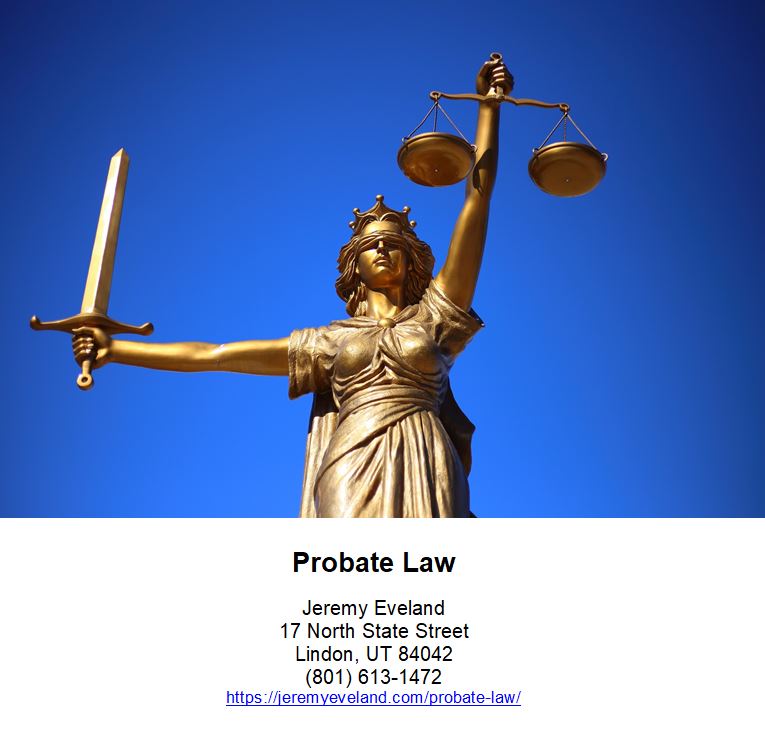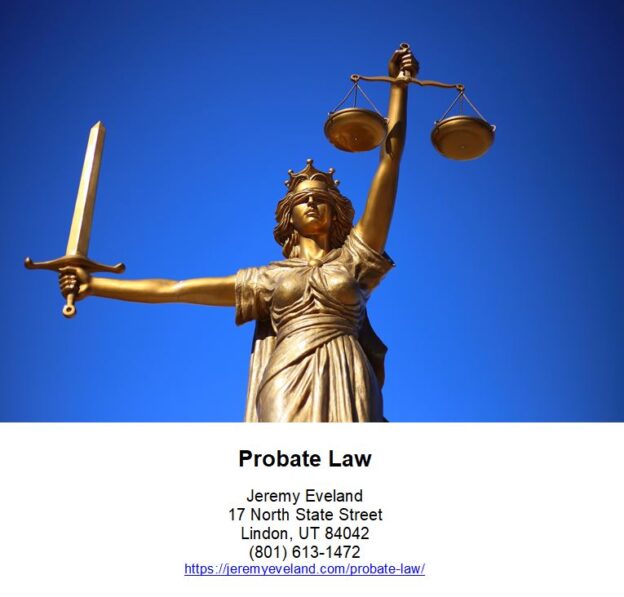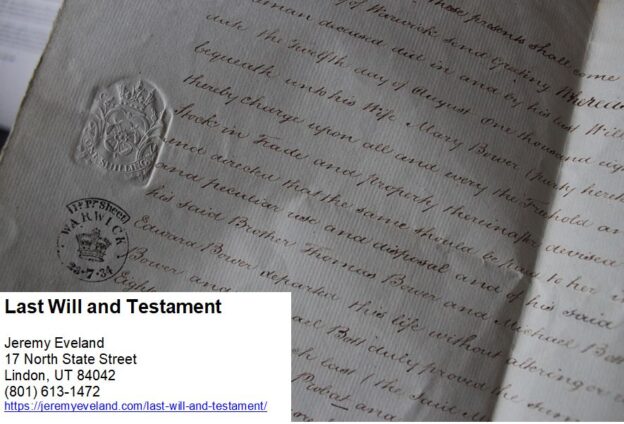Probate Law
“Secure Your Legacy with Probate Law”
Introduction
Probate law is a branch of law that deals with the administration of a deceased person’s estate. It involves the process of proving the validity of a will, determining the legal heirs of the deceased, and distributing the assets of the estate according to the will or the laws of intestacy. Probate law is an important part of estate planning and is essential for ensuring that the wishes of the deceased are carried out. It is also important for protecting the rights of the heirs and creditors of the estate.
Understanding the Basics of Probate Law
Probate law is a complex area of the legal system that deals with the distribution of a deceased person’s estate. It is important to understand the basics of probate law in order to ensure that the deceased’s wishes are carried out and that the estate is distributed in accordance with the law.
The first step in the probate process is to determine whether or not the deceased had a valid will. If a valid will exists, it must be filed with the court and the executor of the estate must be appointed. The executor is responsible for carrying out the instructions in the will and distributing the estate according to the deceased’s wishes.
If there is no valid will, the court will appoint an administrator to manage the estate. The administrator is responsible for collecting the assets of the estate, paying any debts, and distributing the remaining assets to the heirs according to the laws of the state.

Once the executor or administrator has been appointed, they must take an inventory of the deceased’s assets and liabilities. This includes all real estate, personal property, bank accounts, investments, and any other assets. The executor or administrator must also identify any creditors of the estate and pay them from the assets of the estate.
Once the assets and liabilities of the estate have been identified, the executor or administrator must file a petition with the court to open probate. This petition must include a list of the assets and liabilities of the estate, as well as a list of the heirs and beneficiaries. The court will then issue an order that allows the executor or administrator to begin the process of distributing the estate.
The executor or administrator must then notify all of the heirs and beneficiaries of the estate and provide them with a copy of the will or other documents related to the estate. The executor or administrator must also provide the court with an accounting of the estate’s assets and liabilities.
Once the court has approved the distribution of the estate, the executor or administrator must distribute the assets according to the instructions in the will or according to the laws of the state. This includes paying any taxes that may be due on the estate, as well as distributing the remaining assets to the heirs and beneficiaries.
Probate law can be complicated and it is important to understand the basics in order to ensure that the deceased’s wishes are carried out and that the estate is distributed in accordance with the law. It is also important to seek the advice of an experienced attorney who can help guide you through the process.
How to Avoid Common Pitfalls in Probate Law
Probate law can be a complex and confusing area of the law. To ensure that you are able to navigate the process successfully, it is important to be aware of the common pitfalls that can arise. Here are some tips to help you avoid common pitfalls in probate law:
1. Understand the Process: Before beginning the probate process, it is important to understand the steps involved and the timeline for completion. This will help you to plan ahead and ensure that all necessary documents are in order.
2. Hire an Experienced Attorney: Probate law can be complicated and it is important to have an experienced attorney to guide you through the process. An experienced attorney can help you to avoid common pitfalls and ensure that the process is completed in a timely and efficient manner.
3. Follow the Law: It is important to follow the laws and regulations that govern probate law. This includes filing the necessary documents in a timely manner and ensuring that all assets are properly distributed.
4. Keep Good Records: Keeping accurate and up-to-date records is essential for the probate process. This includes keeping track of all assets, debts, and other financial information.
5. Communicate with Beneficiaries: It is important to keep beneficiaries informed throughout the process. This will help to ensure that all parties are on the same page and that any disputes are resolved quickly and efficiently.
By following these tips, you can help to ensure that the probate process is completed in a timely and efficient manner. With the help of an experienced attorney, you can avoid common pitfalls and ensure that the process is completed in accordance with the law.
The Benefits of Working with an Experienced Probate Lawyer
When a loved one passes away, the process of probate can be a difficult and confusing time for those left behind. Probate is the legal process of administering the estate of a deceased person, including the distribution of assets to beneficiaries and the payment of any debts or taxes. It is important to work with an experienced probate lawyer to ensure that the process is handled properly and efficiently.
An experienced probate lawyer can provide invaluable assistance in navigating the complexities of the probate process. They can help to ensure that all legal requirements are met, including filing the necessary paperwork and obtaining court approval. They can also provide advice on how to handle any disputes that may arise between beneficiaries or creditors.
In addition to providing legal advice, an experienced probate lawyer can also provide emotional support during this difficult time. They can help to ensure that the wishes of the deceased are respected and that the estate is distributed according to their wishes. They can also provide guidance on how to handle any difficult conversations that may arise between family members.
Finally, an experienced probate lawyer can help to ensure that the estate is distributed in a timely manner. They can help to ensure that all assets are properly accounted for and that any taxes or debts are paid in a timely manner. This can help to reduce the stress and anxiety associated with the probate process.
Working with an experienced probate lawyer can provide peace of mind during a difficult time. They can provide legal advice and emotional support, as well as ensure that the estate is distributed in a timely manner. This can help to ensure that the wishes of the deceased are respected and that the process is handled properly and efficiently.
What to Expect During the Probate Process
The probate process is a legal process that is used to settle the estate of a deceased person. It is a complex process that involves many steps and can take several months or even years to complete. This article will provide an overview of what to expect during the probate process.
The first step in the probate process is to determine if the deceased person had a valid will. If a will is found, it must be filed with the court. The court will then appoint an executor to oversee the administration of the estate. The executor is responsible for gathering the assets of the estate, paying any debts, and distributing the remaining assets to the beneficiaries.
The next step is to identify and locate the heirs of the deceased person. This can be done by searching public records, contacting family members, and other methods. Once the heirs have been identified, the executor must notify them of their rights and responsibilities.
The executor must then file an inventory of the estate with the court. This inventory must include all assets, debts, and other liabilities of the estate. The court will review the inventory and determine if it is accurate.
Once the inventory is approved, the executor must pay any debts and taxes that are owed by the estate. This includes any outstanding mortgages, credit card balances, and other debts. The executor must also pay any taxes that are due on the estate.
The executor must then distribute the remaining assets of the estate to the beneficiaries. This is done according to the terms of the will or the laws of the state. The executor must also file a final accounting with the court to show how the assets were distributed.
Once all of the assets have been distributed and all debts and taxes have been paid, the executor must file a final report with the court. This report must include a summary of the estate’s assets and liabilities, as well as a list of all beneficiaries and their share of the estate.
The probate process can be a lengthy and complicated process. It is important to understand the steps involved and to be prepared for any delays or complications that may arise. It is also important to seek the advice of an experienced attorney to ensure that the process is handled properly.
Exploring the Different Types of Probate Law Cases
Probate law is a complex and ever-evolving area of the law that deals with the administration of a deceased person’s estate. Probate law cases can involve a variety of issues, including the distribution of assets, the payment of debts, and the appointment of guardians for minor children. In this article, we will explore the different types of probate law cases and the legal issues they involve.
Will Contests: A will contest is a legal challenge to the validity of a will. This type of case is typically brought by a family member or other interested party who believes that the will does not accurately reflect the wishes of the deceased. In order to successfully challenge a will, the challenger must prove that the will was not properly executed or that the deceased was not of sound mind when the will was created.
Trust Disputes: Trust disputes involve disagreements between the beneficiaries of a trust and the trustee. These disputes can arise over the interpretation of the trust document, the trustee’s management of the trust assets, or the trustee’s distribution of the trust assets.
Estate Administration: Estate administration is the process of managing the assets of a deceased person’s estate. This includes collecting and valuing the assets, paying debts and taxes, and distributing the remaining assets to the beneficiaries. Estate administration can be a complex process, and it is important to have an experienced probate attorney to ensure that the process is handled properly.
Guardianship: Guardianship cases involve the appointment of a guardian for a minor child or an incapacitated adult. The guardian is responsible for making decisions on behalf of the minor or incapacitated person, including decisions about their health care, education, and finances.
Probate law cases can be complex and emotionally charged. It is important to have an experienced probate attorney to help you navigate the legal process and ensure that your rights are protected.
Q&A
1. What is probate law?
Probate law is the legal process of administering the estate of a deceased person. This includes identifying and collecting the deceased person’s assets, paying any debts and taxes, and distributing the remaining assets to the beneficiaries of the estate.
2. Who is responsible for administering a probate estate?
The executor of the estate is responsible for administering the probate estate. The executor is typically named in the deceased person’s will, or if there is no will, the court will appoint an administrator.
3. What is the difference between a will and a trust?
A will is a legal document that outlines how a person’s assets should be distributed upon their death. A trust is a legal arrangement in which a person (the grantor) transfers ownership of their assets to a trustee, who then manages the assets for the benefit of the beneficiaries.
4. What is the probate process?
The probate process involves filing the necessary paperwork with the court, notifying creditors and beneficiaries, collecting and managing the assets of the estate, paying any debts and taxes, and distributing the remaining assets to the beneficiaries.
5. What happens if there is no will?
If there is no will, the court will appoint an administrator to manage the estate. The administrator will follow the laws of the state to determine how the assets should be distributed.
Probate Law Consultation
When you need legal help with probate law call Jeremy D. Eveland, MBA, JD (801) 613-1472 for a consultation.
Jeremy Eveland
17 North State Street
Lindon UT 84042
(801) 613-1472
Home
Related Posts
Goals of Estate Planning
What Is The Difference Between Corporate And Commercial Law?
Business Credit
Business Contract Lawyer West Valley City
Commercial Real Estate Law
AI Business Consultant
Estate Planning Documents
Mechanic’s Lien in Utah
Business Lawyer West Jordan Utah
Artificial Intelligence
Irrevocable Life Insurance Trusts
What Is The Purpose Of A Business Attorney?
Commercial Lease Lawyer
Business Transaction Lawyer Provo Utah
What Is An LLC?
Boutique Law Firm
Contract Negotiation
Employment Law
Trusted Personal Injury Attorneys in Utah
Tort Law
Legal Requirements to Start a Business
Contract Law for Businesses
Business Law and Taxes
Contract Lawyer
Real Estate Attorneys in Salt Lake City Utah
Probate Law












